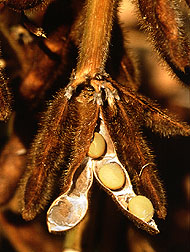This page has been archived and is being provided for reference purposes only. The page is no longer being updated, and therefore, links on the page may be invalid.
|
|
Mapping Flood-Prone Soybean FieldsBy Don ComisJanuary 24, 2000 Two days of wet “feet” can be enough to cost soybean farmers a quarter of their crop, depending on variety, soil type and growth stage. To help develop more flood tolerant varieties, Agricultural Research Service plant physiologist Tara T. VanToai is using a robotic camera system to “mass screen” soybean seedlings for flood tolerance. The system uses cameras to record seedlings’ reactions to nutrient solutions through which air containing 30 percent carbon dioxide is bubbled. VanToai has found that too much CO2 in flooded soils causes yield losses, so the seedling’s reaction to high CO2 is a key indicator of flood tolerance. To determine the relative roles of variety type and other farm conditions on the flooding losses, VanToai and colleagues carried a Global Positioning System receiver in a backpack across flooded soybean fields in Ohio. They mapped six fields on private farms. VanToai is with the ARS Soil Drainage Research Unit in Columbus, Ohio. She did the mapping with colleagues at The Ohio State University at Columbus and USDA’s Natural Resources Conservation Service as well as farmers. Scientists are using the mapping data to develop a statistical model to identify the factors that most affect soybean yields in flooded fields. NRCS would use the model for tailor-made advice to farmers on ways to minimize flood losses, such as which soil types are particularly vulnerable to flooding. It would be especially important for farmers to plant only the most flood-tolerant varieties on those soils. ARS is the chief scientific agency in the U.S. Department of Agriculture. Scientific contact: Tara T. VanToai, ARS Soil Drainage Research Unit, Columbus, Ohio, phone (614) 292-9806, fax: (614) 292-9448, tvantoai@magnus.acs.ohio-state.edu. |

